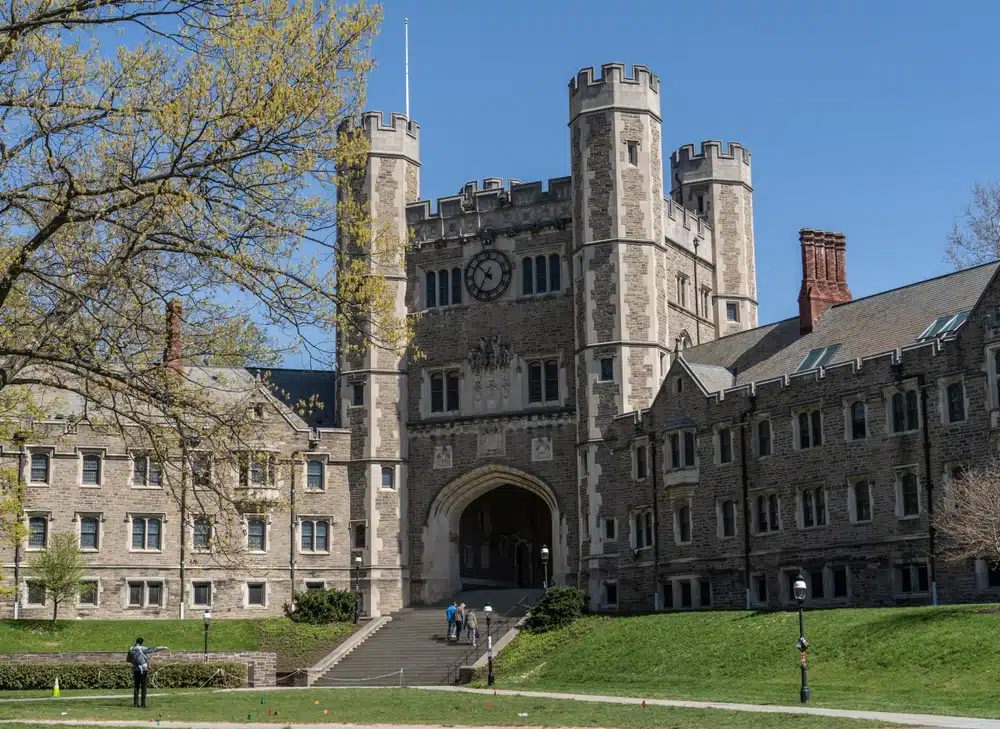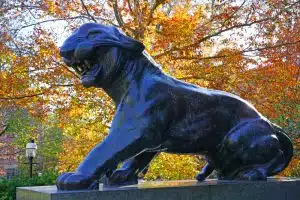Exploring the Elite History of Princeton’s Ivy Club
As one of the most prestigious and exclusive eating clubs on Princeton University‘s campus, the Ivy Club has a storied history that spans over a century. From its architecture to its traditions, the club has left an indelible mark on both Princeton and the broader cultural landscape of America. In this article, we will take a deep dive into the history and legacy of the Ivy Club.
The Origins of the Ivy Club
The Ivy Club was founded in 1879 by a group of ambitious Princeton students who wanted to establish a unique social organization that stood out from the other eating clubs on campus. Its early years were marked by a dedication to academic excellence, with members striving to excel in their studies while also enjoying the camaraderie and fellowship that the club provided.
Founding Members and Early Years
The club’s founding members were a diverse group of young men, hailing from all corners of the United States and representing a range of social and economic backgrounds. They were united by a shared belief in the power of education and the importance of intellectual diversity. The early years of the club were characterized by lively debates, intellectual pursuits, and long hours spent discussing the great works of literature and philosophy.
One of the most notable founding members of the Ivy Club was Woodrow Wilson, who later went on to become the President of the United States. Wilson was a passionate advocate for education and believed that the Ivy Club could serve as a model for other institutions of higher learning.
The Club’s Connection to Princeton University
Throughout its history, the Ivy Club has maintained a close relationship with Princeton University, serving as a hub for campus life and a center for intellectual discourse and debate. The club has played an important role in shaping the culture of Princeton, influencing the social, academic, and political trends of the university.
One of the ways in which the Ivy Club has contributed to the intellectual life of Princeton is through its renowned speaker series. Over the years, the club has hosted a wide range of distinguished speakers, including politicians, academics, and business leaders. These events have provided a platform for lively discussion and debate, and have helped to foster a culture of intellectual curiosity and engagement on campus.
Architectural Evolution of the Clubhouse
One of the most impressive aspects of the Ivy Club is its architectural legacy. Over the years, the club’s clubhouse has undergone a number of renovations and modifications, reflecting the changing tastes and preferences of its members. Today, the clubhouse is a stunning example of Gothic Revival architecture, with elegant stone facades and intricate carvings that evoke the grandeur and prestige of Princeton’s past.
One of the most significant renovations to the clubhouse took place in the early 20th century, when the club commissioned the renowned architect Ralph Adams Cram to design a new building. Cram was a leading figure in the Gothic Revival movement and his design for the Ivy Club was widely praised for its beauty and elegance.
Today, the Ivy Club remains one of the most prestigious and influential social organizations on the Princeton campus. Its commitment to academic excellence and intellectual diversity continues to inspire generations of students, and its architectural legacy serves as a testament to the enduring power of tradition and innovation.
Membership and Traditions
The Ivy Club has always been known for its highly selective membership process, which involves a rigorous application and interview process. Successful applicants must meet a range of criteria, including academic achievement, social standing, and personal character. Once accepted, members are expected to uphold the club’s traditions and values, including its commitment to intellectual discourse, community service, and philanthropy.
The Ivy Club was founded in 1879 by a group of Princeton students who were looking for a space where they could engage in intellectual discussions and socialize with their peers. Over the years, the club has grown into one of the most prestigious and exclusive organizations on campus, attracting some of the brightest and most accomplished students from around the world.
The Selection Process and Notable Alumni
Over the years, the Ivy Club has attracted a number of notable alumni, including politicians, writers, and business leaders. However, the selection process remains highly competitive, with only a small percentage of applicants ultimately gaining entry to the club. Members are chosen not just for their academic and social accomplishments, but also for their potential to contribute to the intellectual and cultural life of the club.
One of the most famous Ivy Club alumni is former U.S. President Woodrow Wilson, who was a member of the club during his time at Princeton. Other notable alumni include journalist and author F. Scott Fitzgerald, businessman and philanthropist David Rockefeller, and former New Jersey Governor Jon Corzine.
Annual Events and Gatherings
The Ivy Club hosts a number of annual events and gatherings for its members, including formal dinners, receptions, and charity events. These occasions provide an opportunity for members to come together and celebrate the club’s traditions and achievements, while also giving back to the community through charitable giving and service projects.
One of the most popular events hosted by the Ivy Club is the annual Spring Fling, a weekend-long celebration that includes live music, dancing, and other festivities. The club also hosts an annual charity auction, where members can bid on a variety of items and experiences, with all proceeds going to support local community organizations.
The Role of the Ivy Club in Campus Life
Despite its reputation as an exclusive and elite organization, the Ivy Club has always been deeply connected to the broader campus community at Princeton. Through its commitment to service and philanthropy, the club has played an important role in addressing some of the most pressing social issues of our time, including poverty, inequality, and education.
The Ivy Club has a long history of supporting local and national charities, and members are actively encouraged to get involved in service projects and volunteer work. In recent years, the club has focused its efforts on supporting organizations that work to promote diversity and inclusion on campus, including groups that advocate for LGBTQ+ rights and racial justice.
Overall, the Ivy Club remains a vital and dynamic part of campus life at Princeton, providing a space for students to engage in intellectual discourse, socialize with their peers, and give back to the community through service and philanthropy.
Controversies and Challenges
Like any institution with a long and storied history, the Ivy Club has faced a number of controversies and challenges over the years. From questions of gender inclusivity to concerns about socioeconomic diversity, the club has had to navigate some difficult waters in order to maintain its relevance and prestige.
The Fight for Gender Inclusivity
One of the most notable challenges facing the Ivy Club in recent years has been the push for greater gender inclusivity. While the club has historically been an all-male organization, there has been a growing movement among students and alumni to open up membership to women and non-binary individuals. This push has been met with resistance from some members, who argue that the club’s traditions and values are rooted in a specific vision of masculinity that cannot be compromised.
However, many argue that the exclusion of women and non-binary individuals perpetuates a culture of sexism and discrimination. In response to this criticism, the Ivy Club has taken steps to create more inclusive policies, such as allowing women and non-binary individuals to attend certain events and activities.
Despite these efforts, the debate over gender inclusivity in the Ivy Club continues to be a contentious issue, with both sides making passionate arguments for their positions.
Socioeconomic Diversity and Access
Another challenge facing the Ivy Club is the ongoing need to address issues of socioeconomic diversity and access. While the club has made some strides in recent years to recruit members from a wider range of backgrounds, there is still much work to be done to ensure that the club is truly representative of the broader Princeton community.
One of the main obstacles to achieving greater socioeconomic diversity is the cost of membership. The Ivy Club is known for being one of the most expensive eating clubs at Princeton, with annual dues running into the thousands of dollars. This makes it difficult for students from lower-income backgrounds to afford membership, and can contribute to a sense of exclusion and elitism.
To address this issue, the Ivy Club has implemented a number of initiatives aimed at increasing access for students from diverse socioeconomic backgrounds. These include offering financial aid for membership dues, as well as partnering with other organizations on campus to provide resources and support for low-income students.
Addressing the Club’s Exclusive Reputation
Finally, the Ivy Club has also had to grapple with the perception that it is an exclusive and elitist organization, catering only to those with social and economic privilege. While the club has worked to counter this perception through its philanthropic and community outreach efforts, there is still a long way to go to change the narrative around the club and its values.
One of the ways the Ivy Club has sought to address this issue is by increasing its engagement with the broader Princeton community. The club has hosted a number of events and activities that are open to the public and has also partnered with local organizations to support charitable causes and community initiatives.
Additionally, the Ivy Club has made a concerted effort to promote diversity and inclusion within its own membership. This includes recruiting members from a wider range of backgrounds, as well as providing training and education around issues of privilege and bias.
Despite these efforts, the Ivy Club continues to face criticism for its perceived exclusivity and lack of diversity. However, the club remains committed to addressing these issues and evolving to meet the changing needs and expectations of the Princeton community.
The Ivy Club Today
Despite these challenges and controversies, the Ivy Club remains an important and influential institution at Princeton University and beyond. Today, the club continues to evolve and adapt to new social and cultural realities, while also preserving its rich history and traditions.
Modernization and Adaptation
In recent years, the Ivy Club has undergone a process of modernization and adaptation, reflecting changing attitudes and values among its members and the broader campus community. This has involved opening up membership to a wider range of individuals, as well as embracing a more inclusive and diverse set of values and traditions.
The club has made significant strides in this area, with many new members from diverse backgrounds joining in recent years. These members bring with them a wealth of new perspectives and experiences, enriching the club’s culture and community. Additionally, the club has made efforts to be more welcoming and inclusive to all members, regardless of their background or identity.
Philanthropy and Community Outreach
The Ivy Club has also become increasingly involved in philanthropic and community outreach initiatives, reflecting its commitment to social justice and equality. Through partnerships with local organizations and charities, members of the club have had a tangible impact on the lives of people in the wider Princeton community, while also furthering the club’s core values and ideals.
One recent initiative involved partnering with a local food bank to provide meals for families in need. Ivy Club members volunteered their time to help pack and distribute food, and the club also made a significant donation to support the food bank’s ongoing efforts. This is just one example of the many ways in which the Ivy Club is working to make a positive impact in the world.
The Future of the Ivy Club and Princeton’s Eating Clubs
Looking ahead, the Ivy Club and other eating clubs at Princeton face a number of challenges and uncertainties. From questions of sustainability to the ongoing need for greater diversity and inclusivity, there are many issues that will need to be addressed in order to ensure that these institutions remain relevant and meaningful in the years to come.
One potential solution to these challenges is greater collaboration and cooperation between the various eating clubs at Princeton. By working together, these clubs can share resources and ideas, and create a more cohesive and inclusive social community on campus.
Ultimately, however, the Ivy Club’s rich history and legacy will continue to set it apart as one of the most prestigious and influential social organizations in America. Whether through its commitment to academic excellence, its dedication to community service and philanthropy, or its enduring architectural legacy, the Ivy Club remains a vital and vibrant part of the cultural fabric of Princeton University and the wider world beyond.
How AdmissionSight Can Help You With College Admissions
Hello, we’re AdmissionSight, a dedicated college admissions consulting service. We’re committed to helping high school students navigate the complex journey toward admission to top-tier universities. Our team of experienced consultants guides you through every step, from strategic planning and course selection to crafting compelling personal statements and interview preparation.
We understand that each student is unique, and we help you communicate your individual story in a way that will resonate with admissions committees. Our data-driven approach, personalized strategies, and commitment to reducing stress throughout the process have led to a high success rate, with many of our students being admitted to Ivy League and other top institutions.
We’re not just about getting you into college; we aim to set you up for success beyond, by helping you develop a strong academic and extracurricular profile. Contact us and let’s turn your college dreams into reality!









































